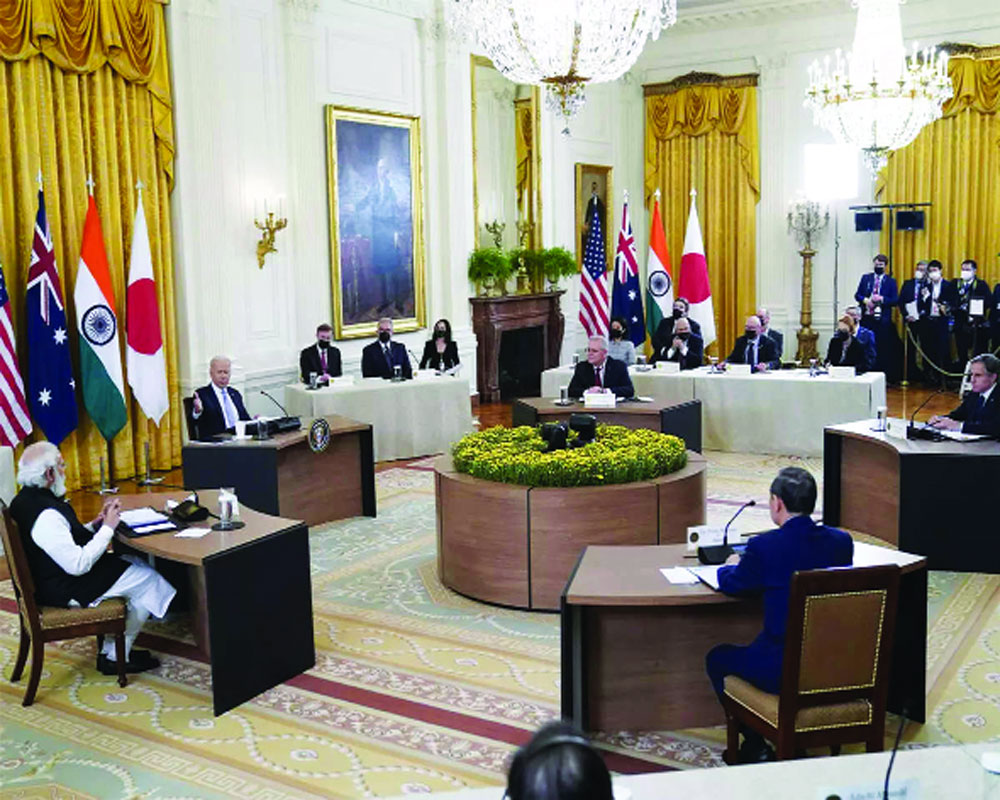‘Containing’ China is Quad’s focus, like ‘containing’ USSR was NATO’s
Never mind AUKUS. It’s the Quad that counts. The creation of an Australia-United Kingdom-United States military alliance last week caused a tempest in a teapot, but the real action was elsewhere. In Washington on Friday the Quad held its first-ever face-to-face summit, and defined the sides in the great-power confrontation for the next generation. Nobody was willing to say the word ‘China’ out loud, but ‘containing’ China is just as much the focus of the Quad as ‘containing’ the Soviet Union was when NATO was founded 72 years ago. The United States, India, Japan and Australia have more than two billion people to China’s 1.4 billion, and economies that add up to around twice the size of China’s. All the Quad members except Japan still have growing and relatively young populations, whereas China’s population is rapidly ageing and predicted to start falling fast by 2030. It’s becoming commonplace to see claims in Western media that China now has “the world’s largest navy”, but that’s only if you count every rowboat and rubber dinghy. In terms of serious naval hardware, China has one-sixth of the tonnage of the Quad navies, including only two aircraft carriers to 15 for the Quad and twelve nuclear-powered submarines to 69. So, what’s this all about? The Chinese are clearly not equipped for a bid at world conquest, and the country’s rulers are obviously not interested in spreading their ideology either. They don’t even believe in it themselves: Communism provides a rhetorical excuse for single-party authoritarian rule, but the economy is capitalism “with Chinese characteristics”. It’s superficially about minor territorial issues around China’s perimeter, but just below the surface it’s about sheer power in an almost abstract sense. The United States has been the world’s paramount power for the past 75 years, and China is a challenger with its own sense of manifest destiny. For Japan and India, lesser great powers that have minor border disputes with China, an alliance with the United States is a cheap and handy insurance policy. For Australia, perpetually nervous about being all alone as a Western country in Asia, alliance with America has been the sole foundation of defence policy ever since the end of the British empire. These confrontations are normal, even cyclical, and they have been coming along at around half-century intervals for the last 400 years. What drives them, regardless of what people tell themselves at the time, is mostly differential growth rates in the power of great states. That’s what’s happening right now. It’s not about ‘freedom’ or ‘socialism’ or the right of navigation in the South China Sea. It’s about the pecking order, pure and simple - and it doesn’t have to end in a great war. These cycles always used to end in that sort of war, but the last one didn’t, and this one may not either. The last one ended peacefully because the challenger ran out of steam: the old Soviet Union just collapsed economically. China is unlikely to collapse, but it’s no longer growing very fast economically, and the threat of global warming might ultimately distract both contenders from this foolish contest. It could also go another way, especially if President Xi Jinping should decide to invade Taiwan, but most of the irritants that are being used to justify the militarisation of the Quad - Hong Kong, the treatment of Uyghurs in Xinjiang, China’s actions on the Indian border, etc. — do not threaten the international order. And then there’s nuclear weapons, the other main reason that the 40-year US-Soviet confrontation did not end in a world war. Cheer up. It may never happen.
(Gwynne Dyer’s new book is ‘The Shortest History of War’. The views expressed are personal.)
























